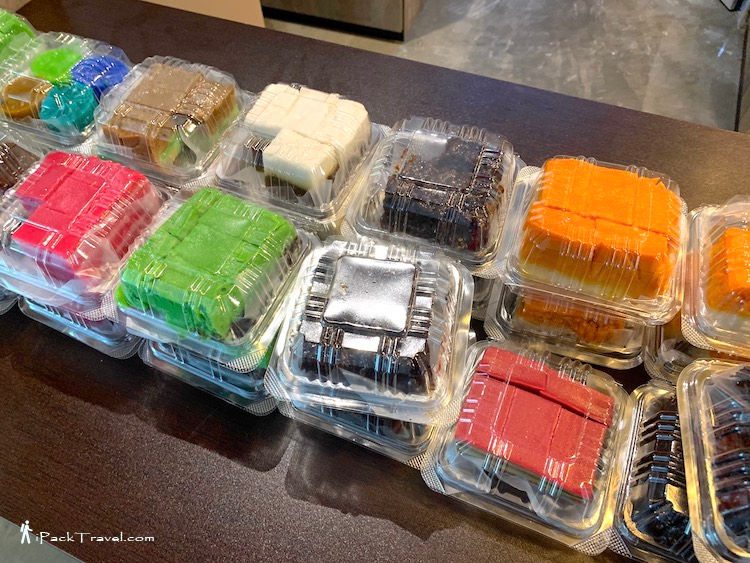Singapore Buy: The Kuihmaker Malay & Nyonya Kuih @ Bukit Batok West
- Rick

- Mar 15, 2025
- 3 min read
Updated: Sep 22, 2025
The Kuihmaker makes kuih — that is very clear. It occupies a small shop below a HDB flat in Bukit Batok West, right next to Aces League 447 Coffee Shop. A bar counter fronted the shop and the kuihs are freshly-made in the kitchen to the rear of the shop.

The Kuihmaker makes both Malay and Nyonya kuihs and other traditional pastries and desserts as well as curry puffs (specifically Malay-style "epok-epok"). The names of the kuihs are written on a chalkboard-menu and some kuihs are indicated as available on weekends only.

Most of the kuihs are laid out in the glass shelf for picking as desired. Each box can hold up to 5 kuihs.

For 4 or more pieces of the same kind, get a box instead. Some of the kuihs here are unique and have special flavours — and off the menu.

Kuih puteri salat (top-left) is a common kuih in Singapore and Malaysia. The pandan-flavoured kuih has mild-savoury glutinous rice as its base, taking up half the kuih. The top layer is the flavouring that is made using pandan leaves, egg and coconut milk, giving the kuih a pandan-egg-custard flavour and soft-creamy texture.
Puteri salat pulut hitam (top-right) is another version of the pandan kuih using black glutinous rice. Unlike the white glutinous rice that is soft after being heated, black glutinous rice is chewier with coarser texture due to the rice husks. The unique flavour of black rice, with pandan custard, gives the kuih a whole new taste experience.
Durian is an aromatic fruit in Asia and its flesh is often used as additive to enhance the aroma of many forms of snacks, pastries and desserts. The Kuihmaker’s durian-flavoured kuih (bottom-left) has a dark-yellowish top layer made with durian purée. Coconut milk is used to cushion the strong aroma and taste of durian.
Similarly, the jackfruit-flavoured kuih (bottom-right) has a dark-orange top layer, made with jackfruit and coconut milk. The kuih has a light milky-jackfruit aroma and taste.

Aside from the usual version with glutinous rice, The Kuihmaker has another version of puteri salat using sweet corn (top-left) as its bottom layer. The corn-base is not sweetened so the flavour of the kuih is mainly from the pandan custard on top.
Talam suji (top-right) is generally made using palm sugar, coconut milk, egg, cornflour, etc, offering a sweet kuih with nice palm sugar flavour and different texture.
The Kuihmaker has 2 types of cassava (or tapioca) kuih, or getuk ubi. One uses grated cassava (bottom-left) and the other uses small chunks of cassava (bottom-right). Unlike typical yellow cassava kuih that is made with coconut milk, The Kuihmaker’s getuk ubi are bright orange in colour, due to the additional use of gula Melaka, and have nice flavours.

Under The Kuihmaker's "Special" menu, the talam ubi is another 2-layered non-rice-based kuih. It has a white top layer made with coconut milk and a bottom layer made of grated cassava and gula Melaka. This is nice and pleasant too.

The lapis kacang hijau (green bean layered kuih), available only on weekends, has alternating layers of dark-greenish mung bean and brownish gula Melaka with a thicker texture than other kuihs. It has nice aroma, rich mung bean and gula Melaka flavours and not sweet — I'm starting to love this kuih after two tries.

Wajik Durian D24, available only on weekends too, is a sweet dessert with glutinous rice grains in sweet durian and gula Melaka paste. The kuih / dessert has rich durian aroma and tastes similar to lempok durian cake (usually sold in tube-form) and is very soft.

Ever heard of Malaysians eating durian with rice? Since Thais eat sticky glutinous rice with mango and coconut milk, it should not be surprising to have glutinous rice with durian, thus giving rise to the dessert called "serawa durian".
The Kuihmaker’s serawa durian is sold in plastic cups with sticky glutinous rice and D24 durian purée mixed with gula Melaka and coconut milk. It is a flavourful dessert to have after lunch. Wait for it to thaw completely before eating.

The kuihs and desserts that I have tried at The Kuihmaker are not too sweet and with nice flavours. Frankly, before I found The Kuihmaker, all Nyonya and Malay kuihs were just "kuih" to me. When writing this post, I learnt their names and the clear and distinct flavours of the kuihs helped me to affirm the ingredients used.
Social Media:
Address:
Blk 447 Bukit Batok West Ave 9, #01-02, Singapore 650447
Opening Hours:
7am to 5pm (Sat & Sun start at 8am) | Closed on Monday & Tuesday
* Operation hours may differ during Ramadan



Comments